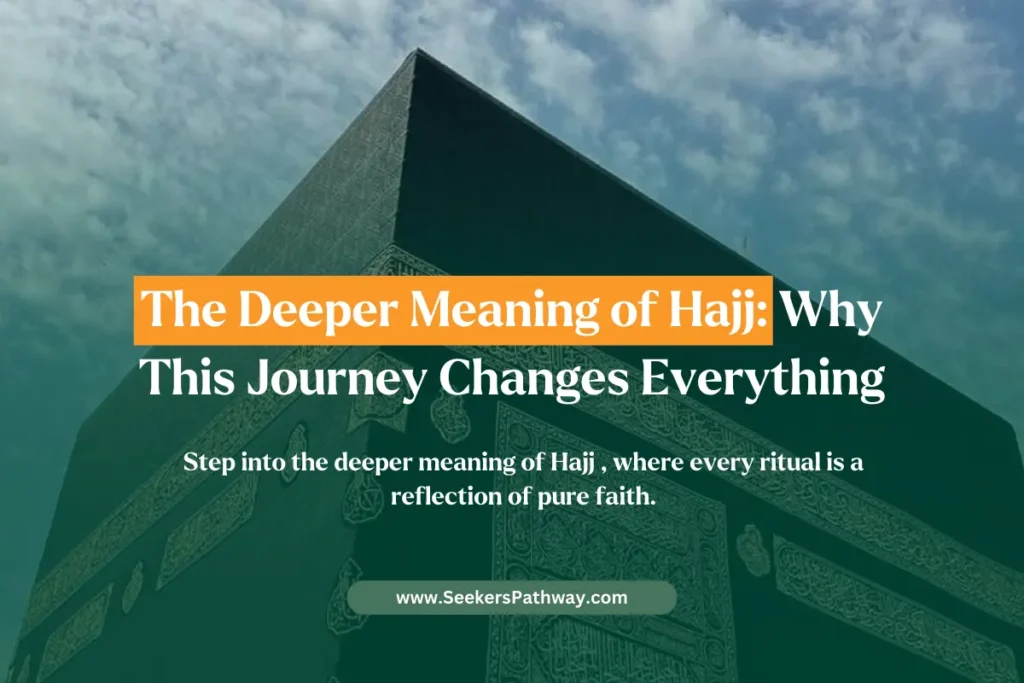Hajj isn’t just one of the pillars of Islam, it is the peak of submission, the physical manifestation of everything a believer has in faith. From the barren lands of Arafah to the holy Kaaba in Makkah, Hajj is a passage in time, in pride, a passage of bridging the gap.
“And [due] to Allah from the people is a pilgrimage to the House – for whoever is able to find thereto a way.”
(Surah Aal-e-Imran 3:97)
Every ritual of Hajj reflects a more fundamental truth: that submission to the will of Allah is not just a matter of belief, but one of action, community, and change.

A Pillar of Islam: Completing the Foundation
Hajj is the fifth pillar of Islam, following:
- Shahadah (faith)
- Salah (prayer)
- Zakah (charity)
- Sawm (fasting in Ramadan)
Hajj is a fardh (obligatory act) for every financially and physically able Muslim. With Hajj packages 2026 now available, there’s no better time to start planning this sacred journey and ensure you don’t miss this once-in-a-lifetime obligation without a valid excuse.
The Prophet ﷺ said:
“Whoever performs Hajj and does not commit any obscenity or sin will return as free of sin as the day he was born.”
(Sahih Bukhari)
This reward reflects the life-altering impact of a sincere Hajj.
Following in the Footsteps of Prophets
Each of the rituals of Hajj is not arbitrary; they are a reenactment of prophetic history:
- Tawaf symbolizes the oneness of Allah and the unity of the believers.
- Sa’i (during the running between Safa and Marwah) respects Hajar(AS) and her Tawakkul(Trust) on Allah during dire need.
- Arafah is an imitation of Prophet Ibrahim (AS) and the last sermon of Prophet Muhammad ﷺ.
- Stoning of the Jamarat symbolizes the renunciation of Satan (Shaytan) and worldly temptation.
- Offering a Qurbani (sacrifice) revives the spirit and profound devotion to Allah of Ibrahim (AS), who obeyed Allah’s command to sacrifice his beloved Son Isma’il (AS).
Each step is a lesson. Each day is a revival.
A Global Gathering of Unity and Equality
Hajj is meant to be a demonstration of the brotherhood of Islam, in which distinctions of race, wealth, nationality and politics disappear.
All are bound in the same white cloth. All sleep under the same sky. All say the same words:
“Labbayk Allahumma Labbayk…” (Here I am, O Allah, here I am)
It’s easily the biggest peaceful gathering on the planet, and, it just as easily could be argued, the most spiritually profound.
“Indeed, this nation of yours is one nation, and I am your Lord, so worship Me.”
(Surah Al-Anbiya 21:92)
A Journey of Transformation
Hajj is not meant to be the end. Its purpose is to restart your life.
- A truthful and authentic Hajj has the power to wipe out previous sins.
- It’s a game changer of habits and inflation of the ego and recasting of life in the key of faith.
- Those who go back home should bring their light to the life of every prayer, every decision, and every day that comes after.
When it’s done with the right heart, Hajj isn’t a memory, it’s a rebirth.
Conclusion
Hajj is a concentration of worship, the reverberations of prophetic footsteps, and a sample of Judgment Day, within a limited time span.
“That [is so]. And whoever honors the symbols of Allah – indeed, it is from the piety of hearts.”
(Surah Al-Hajj 22:32)
The importance of Hajj is to understand that Islam is not just about belief, but about journeying, physically and spiritually, toward submission to Allah.










